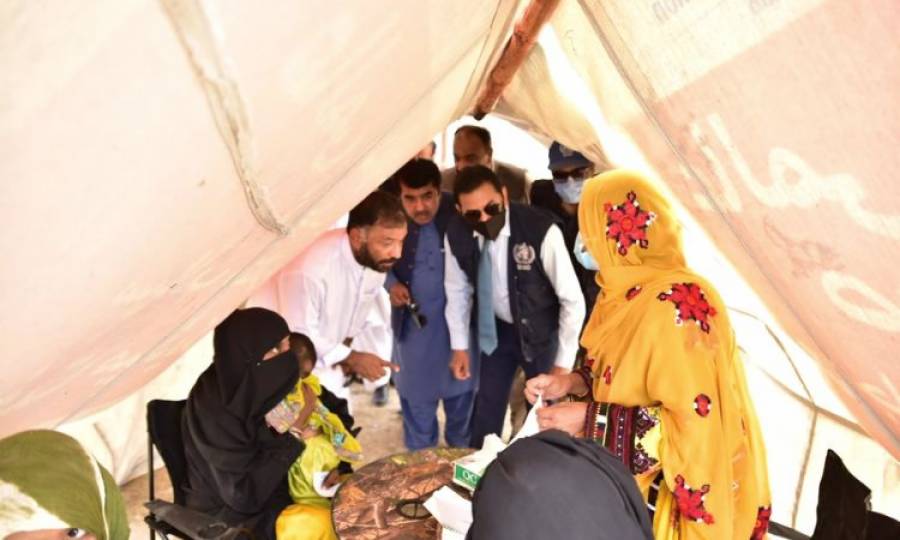WHO representative Dr Palitha Mahipala inaugurates EOC in Pakistan

ISLAMABAD: Dr Palitha Mahipala, World Health Organisation's (WHO) representative in Pakistan, inaugurated an Emergency Operations Center (EOC) for flood response on the premises of the District Health Office.
The EOC was developed with the assistance of WHO Pakistan and the Khyber Pakhtunkhwa Health Department. Dr Palitha Mahipala informed the reporters that the WHO was aware of the destruction caused by the recent floods in Pakistan, which affected 33 million people and more than two million families.
Afterwards, he noted, 6,4 million people need humanitarian help. Dr Palitha Mahipala revealed that the WHO has already established ten EOCs in other regions. "We have developed a solid strategy to assist people, government, and health authorities in responding effectively in flood-affected areas. However, he added that the initial damage is followed by a second wave of infections such as Malaria, dengue fever, and others.
Dr Palitha Mahipala explained that establishing this centre was to coordinate efforts with all partners and funders to respond more effectively to the flooding crisis in D I Khan. It would also assist district administration and health authorities in more effectively delivering required services.
Dr Palitha Mahipala stated, "Today, we have contributed many medications that patients in medical camps require."
Furthermore, he said, "The WHO has committed to renovating ten partially damaged health facilities in addition to renting four properties to rehabilitate destroyed health facilities."
Dr Palitha Mahipala pledged that the WHO would assist the district health authority with the supply of all essential equipment, medications, and human resources. The establishment of a nutrition stabilisation centre that will begin reacting to the nutrition issue in the district within a week was also mentioned.
The WHO official in Pakistan stated that a great deal of work was being done and that the agency would continue to assist the people of D I Khan. He noted that the WHO will also contribute to the restoration of the health sector in Dera.
Dr Palitha Mahipala stated in response to a question that he will also travel to Tank district to meet with district health officials. This facility would also serve Tank and South Waziristan. Dr Palitha Mahipala praised the district health department for its well-mannered reaction to the escalating flood crisis and Malaria outbreak. Mehmood Jan, District Health Officer (DHO), congratulated the WHO delegation for establishing the Emergency Operations Center (EOC) and providing additional support to the district health department.
According to him, the WHO official met all their demands, including the six-month restoration of four non-functioning health facilities on rented premises. In addition to solarising these institutions where necessary, the WHO team agreed to repair ten damaged health facilities. The WHO team also pledged to give all necessary medications.
In response to a query regarding the dengue virus, he stated that the virus was now under control despite the recent floods' elevated danger. Last year, 90 cases of dengue were detected throughout the area; this year, just 28 cases have been reported. This time, Mufti Mehmood Hospital accepted only five dengue patients; none of them was in critical condition. He stated that no dengue-related deaths had been reported since last year.
Dr Asad of the district health department informed the WHO delegation that the recent floods partially damaged 22 health facilities. In comparison, four health facilities were destroyed, including BHU Rasheed, BHU Garra Madda, CD Ratta Kulachi, and CD Garra Rehman. About illness patterns in flood medical camps, he recorded 9145 cases of diarrhoea, 8937 cases of acute respiratory infections (ARI), 9887 cases of skin-related disorders, 1519 cases of eye diseases, 246 cases of typhoid, 905 cases of Malaria, and 710 cases of other injuries.
Dr Asad revealed that 43 Dengue cases were recorded in May, one case in June, two in July, thirteen in August, and 27 in the present month. Regarding Malaria, he stated that the illness was on the rise following floods, as 2252 positive cases were recorded from 15285 tests completed this month, 1887 in August from 18800 tests, and 885 in July from 14667 tests.
Concerning the challenges of the Health Department, Dr Asad demanded of the WHO team that "we need emergency medicines, rental space and solarised prefabricated structures for six areas where the buildings are unsafe for service delivery, vehicles for medicines supply and field operations to areas with damaged roads access, provision of mental health services in flood-affected areas, and rehabilitation of 22 flood-affected health facilities in addition to solarisation." The WHO team agreed to satisfy the district health department's requests.
Advertisement
Trending
Popular
Aging: New study identifies key lifestyle, environmental factors ...
-
Hair loss: Discovery uncovers key stem ...
08:00 PM, 25 Feb, 2025 -
Broccoli sprout compound may help lower ...
11:31 AM, 25 Feb, 2025 -
Gas Pain vs. Heart Attack: How to tell ...
09:00 PM, 22 Feb, 2025 -
Coconut oil supplement shows promise ...
08:00 PM, 20 Feb, 2025



